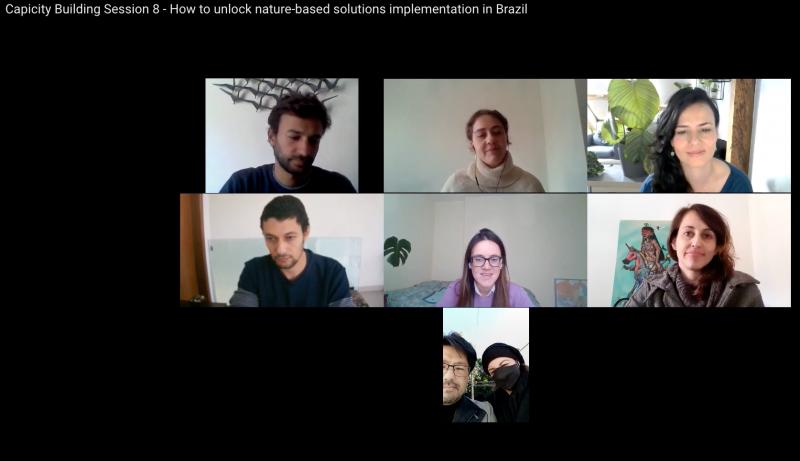
- UrbanByNature Brazil delivered the capacity-building session “How to unlock nature-based solutions implementation in Brazil” at the Connecting Nature Enterprise Summit on 30 June 2021.
- The video of the session is available here (the main language of the session was Portuguese)
- Speakers of the webinar:
- City of Belo Horizonte, Isaac Henrique de Medeiros
- City of Londrina, Luciana Luquez and Robson Shimizu
- Guajava Arquitetura da Paisagem e Urbanismo, Adriana Sandré e Riciane Pombo
- Arup, Larissa Miranda Heinisch
- ICLEI Europe, Elsa Durieux
- Moderators:
- ICLEI Europe, Daniela Rizzi
- ICLEI SAMS, Victor Ferraz
- The key messages are:
- Contracting nature-based enterprises directly with the public sector is not so easy, due to the rules established by the government. Institutions like ICLEI make it easier for enterprises to gain access to projects with the public sector.
- NBS is not yet a concept widely adopted by the government - the lack of knowledge of this concept makes it difficult for city hall technicians to understand and elaborate detailed terms of reference and tenders.
- It is important to disseminate the ‘NBS’ term widely within the public sector. Events and training that highlights NBS ongoing projects and related benefits are really helpful, so that decision makers can embrace the nature-based approach.
- Traditional engineering companies that already work with the public sector usually lack the know-how to implement NBS. Therefore, it is important to create high quality regulations for NBS, public notices that focus on NBS and terms of reference that specifically ask for NBS.
- The participation of local social movements is important to ensure successful NBS implementation, which adapts to local realities and demands. Ideally, the design of projects will involve citizen engagement.
- The elaboration of adequate terms of reference alone does not guarantee an effective implementation of the NBS principles. Technicians need to be convinced and trained to implement proper NBS projects. Regulations for NBS and technical norms and handbooks will help with quality control.
- Innovation in contracting formats for implementing NBS is hampered in city halls by bureaucratic processes and stiff procurement legislations. Nowadays, there is a structural limitation in Brazil for governments to recognise the value of high-quality NBS plans. Usually planning is not as valued as it should and city officials relate the need of resources only for implementation.
- Up-to-date municipal databases are essential to ensure the elaboration of effective terms of reference for NBS. A good idea would be to create a national reference data bank for public terms of reference for NBS, supporting municipalities to learn how other local governments designed their tenders.
- Some other important aspects for the elaboration of the terms of reference is the inclusion of demands for sustainable materials and local suppliers to ensure the sustainability of the project throughout its whole life cycle.
- The Brazilian federal law on contract bidding limits contracts that deviate from the traditional model. A recommended measure is to include NBS in city master plans and climate/biodiversity/resilience strategies, as well as in municipal legislation to provide support and security for decision makers and project implementers.
- It is important to seek alternative criteria for tendering processes that go beyond the criterion of “the lowest price”. The use of the Brazilian tool ‘Registration of Technical Responsibility’ (RRT) is a way to ensure greater technical quality in NBS projects.

